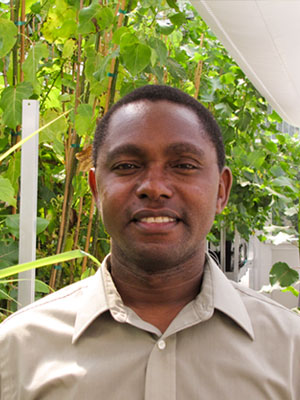
Biosciences Division
Oak Ridge National Laboratory
Phone: (865) 576-0223
Fax: (865) 574-5353
Email : mucherow@ornl.gov
LinkedIn : Profile
ResearcherID : A-9194-2011
ORCID : 0000-0002-0200-9856
Wellington Muchero
Quantitative Geneticist
- Ph.D., Plant Pathology, UC Riverside, 2007
- B.S., Crop Science, Cal Poly Pomona, 2003
Experience:
- Plant Molecular Biologist/Geneticist, Biosciences Division, Oak Ridge National Laboratory (Sep 2010-Present)
- Postdoctoral Scholar, Nematology Dept. University of California, Riverside (Jan 2008 - Sep 2010)
Current Projects
Bioenergy Science Center - http://bioenergycenter.org
The BioEnergy Science Center is one of three Bioenergy Research Centers established by the United States Department of Energy in part to come up with genetic solutions to overcome the key constraint of cell wall recalcitrance in enabling the economic conversion of plant biomass to biofuels. We target cell-wall recalcitrance phenotypes in naturally varying populations of P. trichocarpa and interspecific mapping pedigrees to identify genes that affect lignin content, sugar release, and fermentation efficiency. We established 3 common gardens with replicated clones of P. trichocarpa natural variants in the Pacific Northwest for phenotypic characterization and evaluation of genotype x environment interactions. To complement this phenotypic data, we apply high-density SNP genotyping and whole-genome resequencing to characterize DNA polymorphisms segregating in these populations. We have successfully identified key genes affecting cell wall recalcitrance using a combination of QTL and Linkage Disequilibrium (LD)-based Association Mapping.
Plant Microbe Interfaces
Our primary objective is to identify and characterize genetic determinants that drive Populus spp. interaction with microbial symbionts. We use a combination of statistical and molecular genetics to identify genomic intervals suggestive function in microbial recognition. Currently we are validating and screening insertion/deletion (INDEL) polymorphisms occurring in tandemly duplicated receptor kinases which have been implicated in pattern recognition of carbohydrate moieties in microbial cell walls leading to host immunity or highly specific host-microbe interactions. This work is being conducted within naturally varying P. trichocarpa and P. deltoides populations in the Pacific Northwest and Eastern USA.
Physcomitrella Genome Improvement
Physcomitrella is an evolutionarily important model plant species that provides insight into the emergence of terrestrial flowering plant. It is the first moss to have its genome sequenced. In this project, we are working with an international consortium of scientist from the University of Freiburg - Germany, University of Leeds - UK, DOE-Joint Genome Institute - USA, HudsonAlpha Institute of Biotechnology - USA, and the University of Florida - USA to apply rapid SNP genotyping in the creation of high-density genetic maps to be used in aligning genome scaffolds in addition to QTL mapping.
Allele Mining for Biomass Quality
We are a part of USDA/DOE funded Biomass Feedstocks project in collaboration with scientists at the Michigan Technological University in which we characterize natural variants of genes discovered via activation tagging for their effect on biomass quality and quantity characteristics. We conduct targeted allele mining using whole-genome resequencing on diverse Populus genotypes.